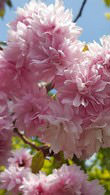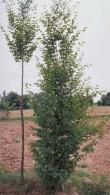Prunus Amanogawa Japanese Flowering Cherry
1. Add items to basket
2. Go to the basket
3. Enter your postcode in Delivery Price Check
Plant shape: Bush
Pot size: 20 Litres
Plant ID: 15220 2
View plant size:Plant shape: Multi-stemmed
Pot size: 20 Litres
Plant ID: 345 2
View plant size:Plant shape: Multi-stemmed
Pot size: 20 Litres
Plant ID: 2368 1
View plant size:Plant shape: Multi-stemmed
Pot size: 35 Litres
Plant ID: 6458 64
View plant size:Plant shape: Full standard
Trunk height: 1.8-2 m
Trunk girth: 10-12 cm
Pot size: 35-45 Litres
Plant ID: 15951 64
View plant size:Plant shape: Full standard
Trunk height: 2 m
Trunk girth: 12-14 cm
Rootball - supplied without a pot
Plant ID: 8348 100
View plant size:Plant shape: Bush
Pot size: 150 Litres
Plant ID: 11591 64
View plant size:To check delivery cost add your plants to basket, then you can type your postcode in our Quick Delivery Price Check.

Prunus Amanogawa, the Japanese Flowering Cherry or The Flagpole Cherry
Upright and narrow, this flowering Japanese cherry works well as an ornamental tree in all gardens. The British plant collector Ernest ‘Chinese’ Wilson first introduced the Prunus ‘Amanogawa’ to Europe in 1916. The small ornamental tree was dubbed ‘Amanogawa’ in Japanese which translates into ‘River in the Sky’. The moniker River in the Sky refers to the tree’s profusion of springtime blossoms that resemble the astronomical arrangement of the Milky Way. The Armanogawa is also commonly called the Japanese Flowering Cherry or the Flagpole Cherry tree. After its introduction, the Armanogawa quickly grew in popularity and was bestowed the Award of Merit from the Royal Horticultural Society in 1931.
This Japanese cherry tree has a delicate appearance with an upright growth habit. Its canopy forms a column shape with extremely erect branches. The tree produces a canopy width of 2 to 5 meters. It is a relatively slow growing tree and usually takes around twenty years to reach a height of 5 meters. The tree’s petite size makes it a classic focal specimen for any garden.
From mid-April to mid-May, the Armanogawa produces large clusters of shell-pink double blossoms that feature a pleasing fragrance. The flowers are delicate and can succumb to a late frost but the tree will suffer no harm if the mercury dips. Following flower production, the tree’s oval bronze leaves appear and quickly turn green. Each leaf measure 5 to 13 centimeters long and 2 to 7 centimeters wide with a serrated edge. In the autumn, the tree’s foliage turns brilliant hues of orange and red.
The Armanogawa Cherry grows best in well-draining soil that contains ample organic material. Plant in full sunlight for best fall colours. When young, the tree usually benefits from staking to protect it from strong winds.
Virtually care free, the Armanogawa requires no pruning to maintain its appearance. However, if pruning is desired it should be carried out in the late summer to give the pruning wounds ample time to heal before winter arrives.
The show stopping beauty of the Armanogawa is undeniable. Its small size makes it perfect for any cottage or urban style garden setting. Once established, the tree is hardy and carefree.





















